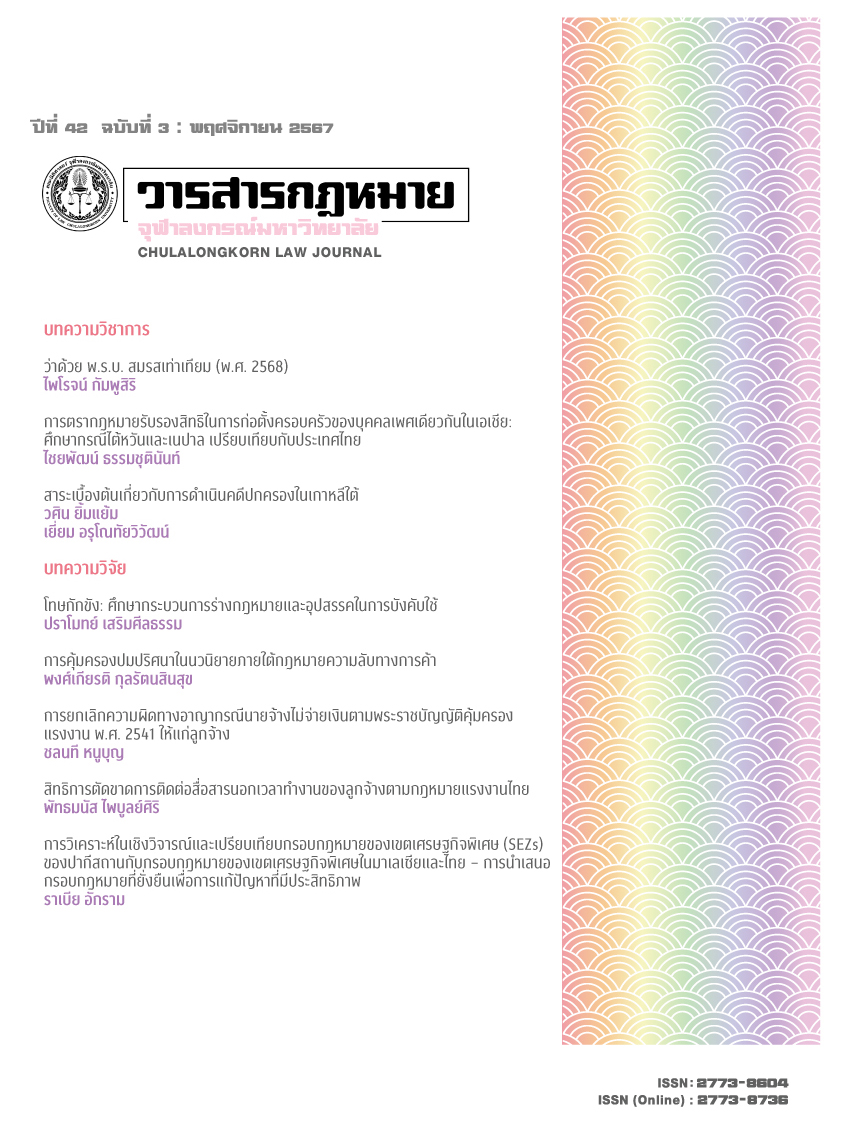สาระเบื้องต้นเกี่ยวกับการดำเนินคดีปกครองในเกาหลีใต้
Main Article Content
บทคัดย่อ
รัฐธรรมนูญของเกาหลีใต้สร้างหลักประกันในบทบัญญัติแห่งรัฐธรรมนูญเพื่อคุ้มครองสิทธิและเสรีภาพขั้นพื้นฐานของประชาชนตามหลักนิติธรรมในแนวทางของการปกครองในระบอบเสรีประชาธิปไตย โดยรัฐธรรมนูญบัญญัติให้องค์กรตุลาการเป็นองค์กรที่มีอำนาจตรวจสอบการใช้อำนาจรัฐขององค์กรของรัฐและเจ้าหน้าที่ของรัฐทั้งหลายว่าชอบด้วยรัฐธรรมนูญและกฎหมายหรือไม่ ในส่วนของการตรวจสอบความชอบด้วยกฎหมายของการกระทำทางปกครองขององค์กรฝ่ายปกครอง แม้ว่าจะมีการจัดตั้งศาลปกครองขึ้นมา แต่ศาลปกครองของเกาหลีใต้มีลักษณะเป็นเหมือนศาลชำนัญพิเศษของศาลยุติธรรม กล่าวคือ เกาหลีใต้ไม่ได้แยกระบบศาลปกครองออกมาจากศาลยุติธรรม ถึงกระนั้น เกาหลีใต้ก็มีการจัดทำกฎหมายว่าด้วยวิธีพิจารณาความคดีปกครองเพื่อใช้กับการพิจารณาคดีปกครองโดยเฉพาะ ทำให้การพิจารณาพิพากษาคดีปกครองในเกาหลีใต้มีคุณภาพของคำพิพากษาหรือคำสั่งไม่ต่างจากประเทศที่แยกระบบศาลปกครองออกจากศาลยุติธรรม
Article Details

อนุญาตภายใต้เงื่อนไข Creative Commons Attribution-NonCommercial-NoDerivatives 4.0 International License.
ลิขสิทธิ์และเนื้อหาในเว็บไซต์ของวารสารกฎหมาย (รวมถึง โดยไม่จำกัดเฉพาะ เนื้อหา รหัสคอมพิวเตอร์ งานศิลป์ ภาพถ่าย รูปภาพ ดนตรีกรรม โสตทัศนวัสดุ) เป็นกรรมสิทธิ์ของวารสารกฎหมาย และผู้ได้รับการโอนสิทธิทุกราย
1. วารสารกฎหมาย ให้อนุญาตให้คุณใช้สิทธิอันไม่เฉพาะเจาะจงที่สามารถถูกถอนเมื่อใดก็ได้ โดยไม่มีค่าใช้จ่าย ในการ
- เยี่ยมชมเว็บไซต์และเอกสารในเว็บไซต์นี้ จากคอมพิวเตอร์หรือเครื่องมือสื่อสารผ่านเว็บบราวเซอร์
- คัดลอกและจัดเก็บเว็บไซต์และเอกสารในเว็บไซต์นี้บนลงคอมพิวเตอร์ของคุณผ่านระบบความจำ cache
- สั่งพิมพ์เอกสารจากเว็บไซต์นี้สำหรับการใช้ส่วนตัวของคุณ
- ผลงานที่ได้รับการตีพิมพ์โดยวารสารกฎหมาย จุฬาลงกรณ์มหาวิทยาลัย ถูกคุ้มครองภายใต้ Creative Commons Attribution 4.0 International License ซึ่งอนุญาตให้ทุกคนสามารถคัดลอก แจกจ่าย ดัดแปลง ส่งต่อ ผลงานได้ ก็ต่อเมื่อผลงานและแหล่งข้อมูลได้รับการอ้างอิงอย่างเหมาะสม
2. วารสารกฎหมาย จุฬาลงกรณ์มหาวิทยาลัย สงวนสิทธิ์ไม่อนุญาตให้คุณใช้สิทธิอื่นใดที่เกี่ยวข้องกับเว็บไซต์และเอกสารบนเว็บไซต์นี้ เช่น การคัดลอก ดัดแปลง เปลี่ยนแปลง ส่งต่อ ตีพิมพ์ แจกจ่าย เผยแพร่ จัดแสดงในที่สาธารณะ ไม่ว่าจะในรูปแบบใดก็ตาม ซึ่งเว็บไซต์หรือเอกสารบนเว็บไซต์ โดยไม่อ้างอิงถึงแหล่งข้อมูลหรือโดยไม่ได้รับอนุญาตเป็นลายลักษณ์อักษรจากวารสารกฎหมาย จุฬาลงกรณ์มหาวิทยาลัย
3. คุณอาจขออนุญาตที่จะใช้เอกสารอันมีลิขสิทธิ์บนเว็บไซต์นี้โดยการเขียนอีเมลล์มายัง journal@law.chula.ac.th
4. วารสารกฎหมาย จุฬาลงกรณ์มหาวิทยาลัย เข้มงวดกับการคุ้มครองลิขสิทธิ์อย่างมาก หากวารสารกฎหมาย จุฬาลงกรณ์มหาวิทยาลัยพบว่าคุณได้ใช้เอกสารอันมีลิขสิทธิ์บนเว็บไซต์นี้โดยไม่ถูกต้องตามการอนุญาตให้ใช้สิทธิ ดังที่กล่าวไปข้างต้น วารสารกฎหมาย จุฬาลงกรณ์มหาวิทยาลัยอาจดำเนินคดีตามกฎหมายต่อคุณได้ เพื่อเรียกร้องค่าเสียหายที่เป็นตัวเงินและคำขอชั่วคราวให้คุณหยุดการใช้เอกสารดังกล่าว ทั้งนี้ คุณอาจถูกสั่งให้ชดใช้ค่าใช้จ่ายใดๆ ที่เกี่ยวข้องกับการดำเนินการตามกฎหมายนี้
หากคุณพบเห็นการใช้เอกสารอันมีลิขสิทธิ์ของวารสารกฎหมาย จุฬาลงกรณ์มหาวิทยาลัย ที่ขัดหรืออาจขัดต่อการอนุญาตให้ใช้สิทธิดังที่ได้กล่าวไปข้างต้น โดยเชื่อว่าได้ละเมิดลิขสิทธิ์ของคุณหรือของผู้อื่น สามารถร้องเรียนมาได้ที่ journal@law.chula.ac.th
เอกสารอ้างอิง
“ระเบียบสำนักนายกรัฐมนตรี ว่าด้วยการพิจารณาชี้ขาดการยุติข้อพิพาทระหว่างหน่วยงานของรัฐและการดำเนินคดี พ.ศ. 2561,” ราชกิจจานุเบกษา เล่มที่ 135 ตอนพิเศษ 49 ง, วันที่ 6 มีนาคม 2561.
Article 2 of Act No. 4765 (Transitional Measures concerning Administrative Cases) 27 July 1994
Article 3 of Act No. 14470 of Concerning Court Organization (Categories of Courts) 2016
Hannes B. Mosler, “The Constitutional Court as a Facilitator of Fundamental Rights Claiming in South Korea, 1988–2018,” in Rights Claiming in South Korea, eds. Celeste L. Arrington and Patricia Goedde (Cambridge University Press, 2021)
Hee-Jung Lee, “Administrative Litigation in Korea: Structures and Roles in Judicial Review”, in Litigation in Korea, ed. Kuk Cho (Edward Elgar Publishing, 2010)
Hee-Jung Lee, “The Structures and Roles in Judicial Review of Administrative Litigation in Korea”, in Journal of Korean Law, 6 (2006): 44-68, 48.
Jean-Marie Woehrling, “Le contrôle juridictionnel de l’administration en droit français”, in Revue française d’administration publique, 30 (1984): 19-43.
John Ohnesorge, “Chinese Administrative Law in the Northeast Asian Mirror”, in Transnational Law & Contemporary Problems, 16 (2006): 126-127.
Jongcheol Kim, “Courts in the Republic of Korea: Featuring a Built-in Authoritarian Legacy of Centralization and Bureaucratization,” in Asian Courts in Context, eds. Jiunn-Rong Yeh and Wen-Chen Chang (Cambridge: Cambridge University Press, 2014)
Joon Seok Hong, “Signaling the Turn: The Supermajority Requirement and Judicial Power on the Constitutional Court of Korea”, in The American Journal of Comparative Law, 67, 1 (2019): 177-217, 180.
Kipyo Kim, “Overview,” in Introduction to Korean Law, ed. Korean Legislation Research Institute (Springer, 2013)
Kuk Cho, Litigation in Korea, (Cheltenham: Edward Elgar Publishing, 2010)
Lisa Blomgren Amsler, Sun Woo Lee, and Won Kyung Chang, “Judicial Independence and Legal Infrastructure: Essential Partners for Economic Development: Participatory Governance in South Korea: Legal Infrastructure, Economic Development, and Dispute Resolution”, in Pacific McGeorge Global Business & Development Law Journal, 19 (2007): 389.
Oh Seung Jin, “Overview of Legal Systems in the Asia-Pacific Region,” [online] Available from : http://scholarship.law.cornell.edu/lps_lsapr/6 [7 September 2023]
Robert A. Dahl and Ian Shapiro, On Democracy, 2nd ed. (Yale University Press, 2015)
Seong Wook Heo, “The Codification of Administrative Law in South Korea,” in Codification in East Asia: Selected Papers from the 2nd IACL Thematic Conference, ed. Wen-Yeu Wang (Cham: Springer International Publishing, 2014)
Supreme Court [S. Ct.], 2000Du7704, 24 August 2001.
Supreme Court of Korea, “The Judiciary,” [online] Available from : https://eng.scourt.go.kr/eng/links/links.jsp [7 September 2023]
The Korea Law Translation Center (KLT), “The Administrative Litigation Act,” [online] Available from : https://elaw.klri.re.kr/eng_mobile/viewer.do?hseq=45101&type=part&key=8#:~:text=The%20purpose%20of%20this%20Act,or%20the%20application%20of%20law%2C [10 September 2023]
Tom Ginsburg, “Confucian Constitutionalism? The Emergence of Constitutional Review in Korea and Taiwan”, in Law & Social Inquiry, 27, 4 (Autumn 2002): 763-799, 766.
Tom Ginsburg, “Constitutional Courts in East Asia: Understanding Variation”, in Journal Comparative Law, 3 (2008): 80-99, 85.
Tom Ginsburg, “Dismantling the “Developmental State”? Administrative Procedure Reform in Japan and Korea”, in The American Journal of Comparative Law, 49, 4 (2001): 596.
Tom Ginsburg, Judicial Review in New Democracies: Constitutional Courts in Asian Cases, (Cambridge University Press, 2003)
ข้อ 5 วรรคหนึ่ง ระเบียบของที่ประชุมใหญ่ตุลาการในศาลปกครองสูงสุดว่าด้วยวิธีพิจารณาคดีปกครอง พุทธศักราช 2543
มาตรา 1 พระราชบัญญัติว่าด้วยการพิจารณาคดีปกครอง
มาตรา 12 ถึง มาตรา 17 พระราชบัญญัติว่าด้วยการพิจารณาคดีปกครอง
มาตรา 194 วรรคหนึ่ง รัฐธรรมนูญแห่งราชอาณาจักรไทย
มาตรา 197 รัฐธรรมนูญแห่งราชอาณาจักรไทย
มาตรา 2 (2) พระราชบัญญัติว่าด้วยการพิจารณาคดีปกครอง
มาตรา 4 พระราชบัญญัติว่าด้วยการพิจารณาคดีปกครอง
มาตรา 4 วรรคสาม พระราชบัญญัติว่าด้วยการวินิจฉัยชี้ขาดอำนาจหน้าที่ระหว่างศาล พุทธศักราช 2542
มาตรา 42 วรรคสอง พระราชบัญญัติจัดตั้งศาลปกครองและวิธีพิจารณาคดีปกครอง พุทธศักราช 2542
มาตรา 44 พระราชบัญญัติวิธีปฏิบัติราชการทางปกครอง พุทธศักราช 2539
มาตรา 49 พระราชบัญญัติจัดตั้งศาลปกครองและวิธีพิจารณาคดีปกครอง พุทธศักราช 2542
มาตรา 7 พระราชบัญญัติว่าด้วยการพิจารณาคดีปกครอง
มาตรา 8 (1) พระราชบัญญัติว่าด้วยการพิจารณาคดีปกครอง
มาตรา 81 รัฐธรรมนูญของประเทศญี่ปุ่น
มาตรา 9 วรรคหนึ่ง พระราชบัญญัติจัดตั้งศาลปกครองและวิธีพิจารณาคดีปกครอง พุทธศักราช 2542
วศิน ยิ้มแย้ม และเยี่ยม อรุโณทัยวัฒน์, “การตรวจสอบการกระทำทางปกครองโดยองค์กรตุลาการในประเทศญี่ปุ่น”, วารสารสังคมวิจัยและพัฒนา มหาวิทยาลัยธรรมศาสตร์, 4, 1 (มกราคม-มีนาคม 2565): 13-28.
박균성, “La Réforme du contentieux administratif en Corée sous l’angle du contentieux administratif en France”, in 지방자치법연구, 8, 3 (2008): 59-72, 61.


